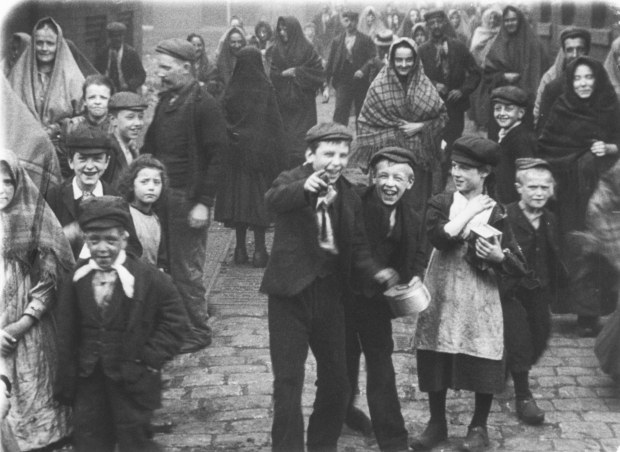The Lost World of Mitchell and Kenyon
Lost film archive reveals life on northern streets of 100 years ago
by Ian Burrell

The earliest known footage of Manchester United and the first filmed reconstruction of the arrest of a fraudster are among gems in an extraordinary archive discovered in metal urns in a Blackburn shop and about to be shown for the first time on television.
Experts at the British Film Institute (BFI) have spent more than three years restoring the 850 recovered films to recreate a remarkable record of Britain in the first decade of the 20th century.
The footage is the work of two Lancastrian entrepreneurs, Sagar Mitchell and James Kenyon, pioneers of British film making who used the earliest camera equipment.
For 13 years, from 1900 till 1913, they toured the great Victorian cities in Britain, recording the momentous events of the time and the everyday lives of working people.
A three-part BBC2 series, called The Lost World of Mitchell and Kenyon , planned for the autumn meant more than a million frames of film had to be carefully restored to the highest quality by the BFI and the BBC. Simon Ford, the executive producer, said: “It’s not Charlie Chaplinesque. There’s no jerkiness and piano accompaniment; it’s much, much clearer.” Mr Ford said Mitchell and Kenyon were motivated by money. “There were no cinemas so they would show the films at fairgrounds or music halls,” he said.
Mitchell and Kenyon filmed workers at factory gates. They recorded troops leaving for the Boer War and migrants embarking from Liverpool for America. They stood in trams and filmed everyday streetlife in cities such as Birmingham, Manchester, Nottingham and Sheffield.
Mitchell and Kenyon also reconstructed the arrest of the notorious fraudster, Thomas Peterson Goudie. Other footage shows the last soldier to receive a Victoria Cross from Queen Victoria. Another sequence captures William “Fatty” Foulke, the 22-stone Sheffield United goalkeeper believed to have inspired the terrace chant “Who Ate All the Pies”, and footage of Manchester United just after they changed their name from Newton Heath in 1902.
Mitchell and Kenyon’s film-making careers finished because they were unable to compete with the might of the growing American movie industry.
The films were lost until a decade ago, when Peter Worden, a film historian, found they had been stored in tall metal containers in the basement of what had been Mitchell’s photographic shop.
[H/T The Independent]